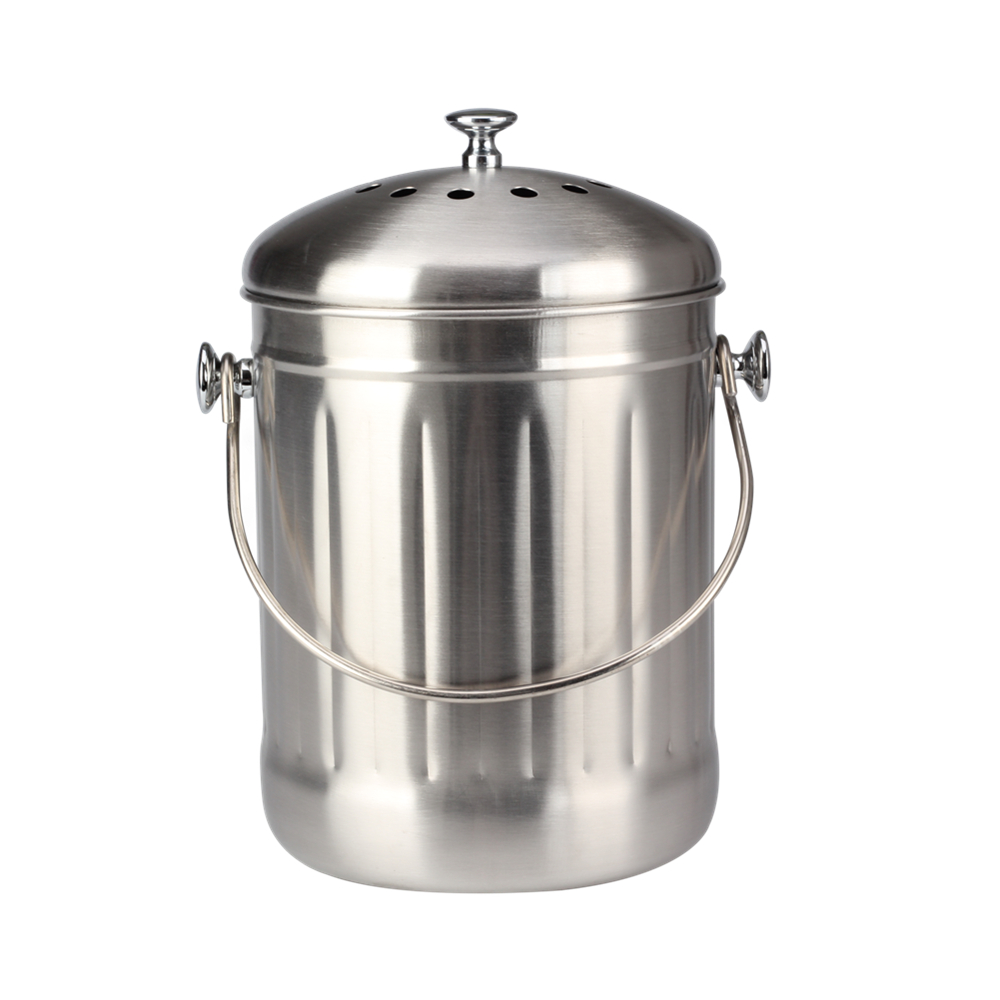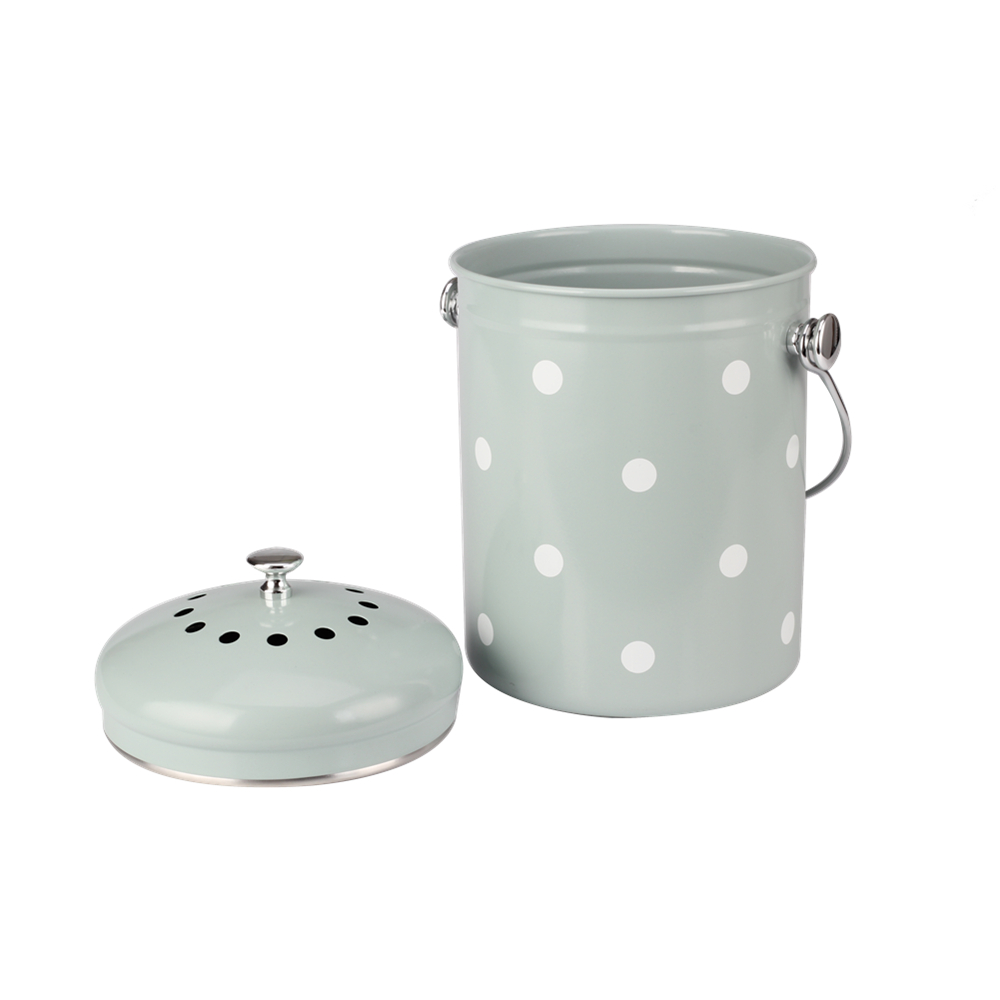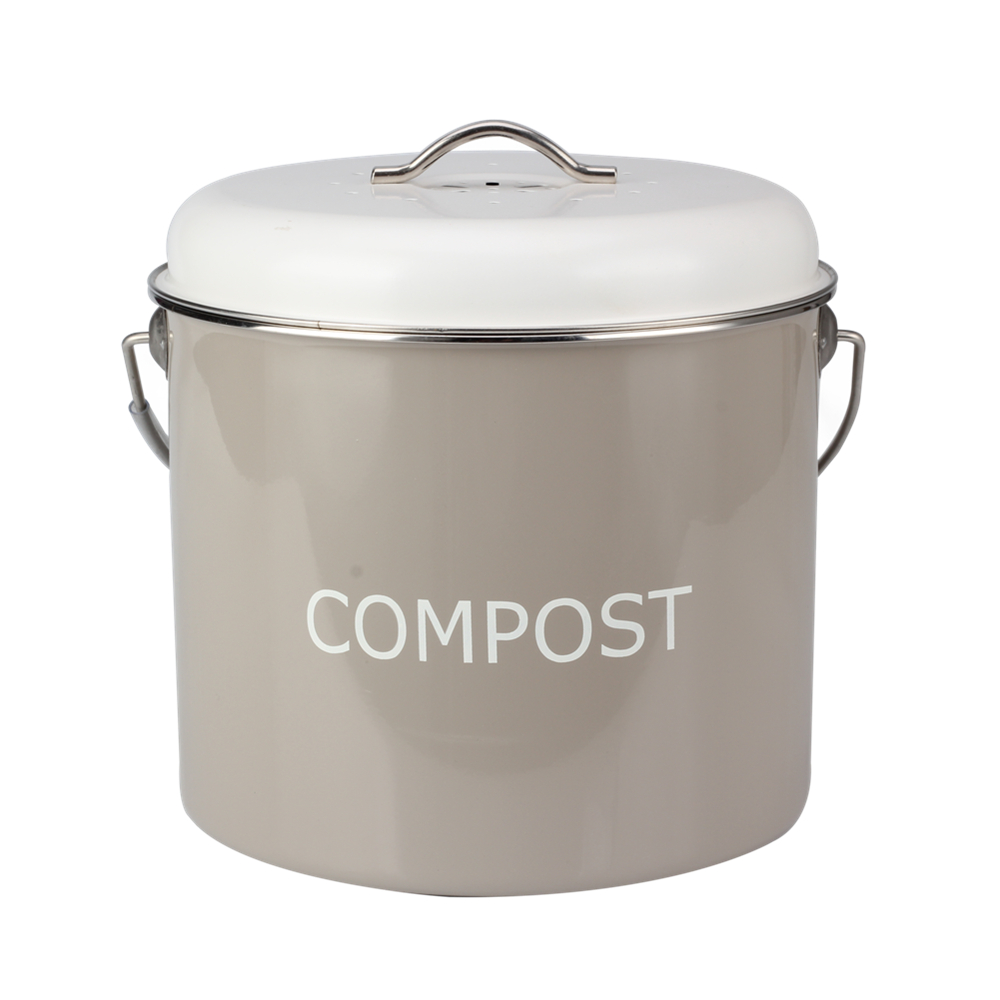Compost Bin
Our factory have many different kinds of compost pail for you to choose. The stainless steel one, and color painting is available. Which also have the Iron material with powder coating items. OEM products is no problem. Welcome to choose the suitable one and ask for more details and the quotation. I believe our rich experience can more helpful for you.
For the compost bin, Excellent quality compost suitable for your kitchen or outside. The airtight lid and replaceable activated-charcoal filter can control odors naturally ,if you need the more better effect, double filter is available. One piece design can resists rust and leaks, big capacity is very useful to enough compostable organic kitchen waste.
The excellent quality compost pail is easily clean and be dry, also the activated-charcoal filter can be cleaned with water and soap ,and easily to replace by another filter.
Material:SS304/SS201/Iron
Finishing: Satin polishing ,Mirror Polishing ,Color painting, Powder Coating
Logo: Laser logo, Etching logo, Silk printing logo, Embossed logo, Decal logo
MOQ : 2000 PCS
Packaging : White box, Mail box or Customized package
Sample Time : 7~10 days
Lead Time :60 days after have the deposit
Payment: T/T ,L/C or others
Payment term: 30% deposit before production and 70 % balance against the copy B/L
FAQ:
1:How can I get the sample?
We can provide the sample for customers to check the quality.
Please kindly provide the delivery info for calculate the sample cost. If you have DHL /TNT/UPS/FEDEX account, please also kindly provide it to us.
You can do the payment of sample via T/T and PayPal.
2:How about the sample time?
Usually the sample time is 7~10 days after have the sample cost.
3:How long will it take for mass production?
Usually 45~60 days after have the deposit.
4:Can we have our logo or company name to be printed on your products or the package?
Welcome OEM.
5:what certificate can you provide?
CE,CB,GS,FDA,LFGB,ROHS are available here.
6:How can we get your monthly new products announcement?
Please join our mailing lists.
Our Service
Excellent quality
OEM packaging and product
Good service
Rich experience save your time and money
Compost Bin,Multicolor Compost Bin,Deodorant Compost Bin,Stainless Steel Compost Bin Jiangmen Wellway Houseware Co.,Ltd , https://www.wellwaycc.com
Agricultural Drought and Drought Assessment is used to determine crop drought conditions and lack of arable land (water) during sowing. There are several ways to evaluate it. Here we use the soil moisture method and the continuous rainless days method f21. In assessing drought conditions in irrigated agricultural areas and irrigated agricultural areas in rain-fed agricultural areas and irrigated agricultural areas, priority should be given to the soil moisture method, and areas without public opinion monitoring sites can choose the continuous rainless days method. Soil moisture refers to the degree of dryness and humidity of the soil, ie, the actual moisture content of the soil. The available soil moisture content is expressed as a percentage of the dry soil weight. The soil moisture content can also be equivalent to the percentage of the field water holding capacity, or relative to the saturated water volume. The relative water content, such as percentage, is expressed.
Through the soil moisture and drought management system, it was found that drought is a long-term precipitation-free weather, air-drying, and soil water shortage. During droughty days when wheat is grown, the water absorbed by the roots from the soil is difficult to compensate for transpiration. The balance of moisture in the plant's body is imbalanced, and the normal growth and development of wheat is severely affected and even killed, and ultimately results in reduced yield and quality. The root of wheat is mainly 0-20 cm, and the suitable soil relative humidity for maintaining a 0-20 cm soil layer is an important condition for stable production and increased yield of wheat. If the relative humidity of the soil can be maintained between 7500 and 800~0 during the wheat growth period, normal growth of the wheat can be maintained. When it is below 700~0, it will have an adverse effect on the growth of wheat.
The use of soil moisture and drought management systems to determine soil moisture content can adequately formulate effective measures to relieve drought, and timely irrigation can fundamentally eliminate this problem. Generally noon irrigation is not suitable. Wet irrigation techniques should be used for a small number of times without flooding. For wheat fields that have suffered less damage, cover the soil between wheat rows with straw, rice straw, leaves, etc. to reduce evaporation loss of soil moisture. Watering should be due to seedlings, late spring wheat to promote the main spring in early spring should not be watered, so as not to reduce the temperature and affect the growth; strong seedlings in the spring to promote the combination of control, poor soil fertility or general land can get up During watering, wheat fields with good soil fertility and relatively large populations do not advocate pouring water, but wheat fields with unguaranted water sources can be watered early; prosperous wheat fields are dominated in the spring and soil fertility is poor. Plots can be watered during the period of getting up. In addition, the crop can also be sprayed with a drought-retentive water-retaining agent (a fulvic acid preparation) to reduce the degree of leaf stomatal opening and to suppress the transpiration loss of water.



Analysis of Soil Moisture and Drought Management Systems Affecting Factors Affecting Wheat Growth
The water demand of plants during the growth process is very large. If the demand and the water content in the soil are not balanced within a certain period of time, the growth and development of plants will be greatly limited due to water shortage. In recent years, due to the shortage of water resources, production and life have been seriously affected. Through comprehensive analysis and sorting, two methods are selected to meet the basic conditions of drought in agricultural droughts in most regions, and the requirements of wheat growth on soil moisture and the impact of agricultural drought on wheat growth are discussed, as well as drought and drought control measures for wheat in order to serve the drought. Work for reference. For soil moisture and drought analysis, soil moisture and drought management systems can now be used for effective measurements.